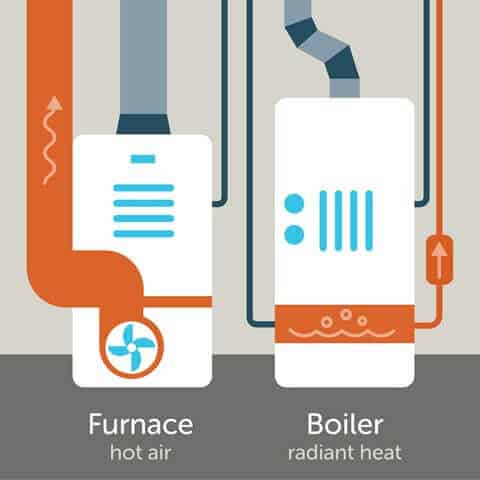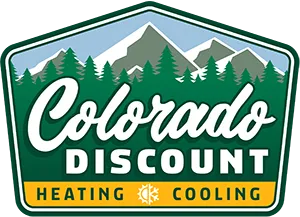
- How each system works
- Upfront Cost VS Utility cost
- Required Maintenance
- Possible Conflicts
Which system is right for you?
Simply put, it depends.
Your priorities and budget play a major role when deciding which system is right for you.
If you’re looking for an energy-efficient way that requires as little maintenance as possible, a natural gas furnace is a great option. It heats your home quickly and efficiently, saving you money on your energy costs over time. If you’re looking for a system for a smaller space, such as a studio or 1-bedroom unit, a boiler may be right for you.
Key Differences
A furnace uses gas (or oil) to heat your home, whereas a boiler uses water, or steam, via heat transfer.
Your HVAC system plays a major role in keeping your home energy efficient and reliably warm, two things that are especially important when living in Colorado (we love our unpredictable weather swings!)
Furnaces require a yearly tune up to ensure peak efficiency and lifespan. However, boilers are at higher risk for water leaks and frozen pipes due to the use of water via heat transfer.
Furnaces improve your indoor air quality, therefor overall personal health, but they require ductwork. Boilers require no ductwork, but this also means they cannot condition/ improve your indoor air quality.
Boilers tend to be quieter than furnaces, but are slower to make an impact on the indoor air temperature.
We’ve put together a concise summary of the pro’s and cons below, as well as a direct comparison when it comes to upkeep, cost, and efficiency:
FURNACE
Pros
- AIR QUALITY – Furnaces improve your indoor air quality, therefor overall personal health.
- EFFECTIVENESS – Furnaces have faster start times and quickly provide comfort to the entirety of your home within a matter of minutes.
- EFFICIENCY – A standard, natural gas burning furnace typically has an AFUE rating of 78-84% though they can go even higher.
Cons
- INITIAL COST – Furnace systems do have a higher initial cost, but since they are so cost-effective and do have an average life expectancy of 15-20 years, this initial spend will offset the overall cost quickly.
- YEARLY TUNE UP – Furnaces do require yearly tune ups to prevent untimely failures. Luckily, as opposed to heat pumps, furnaces are only used during the winter months so this maintenance only has to be completed annually.
BOILER
Pros
- NOISE – Boilers are quieter because they do not heat using forced air.
- GAS – Boilers are generally cheaper to run than furnaces, depending on the size of your space, since they don’t consume gas.
- ZONING – Boilers have zoned heating meaning different rooms can be kept at different comfort levels.
Cons
- EFFECTIVNESS – Boilers are slower to make an impact on the indoor air temperature.
- UPKEEP – On average, boilers are much more complicated to install, replace, and repair as compared to other heating options.
- RISK – Since boilers use a heat transfer with water, potential water leaks and frozen pipes are risks.
Looking for Advice?
If you’re having a hard time deciding between a furnace or a boiler, speak to one of our home pros today! With trusted brands, straightforward communication, and honest prices, we’re excited to assist with your HVAC maintenance. We’re not here to sell you on something that’s not right for your home- we’re here to help
Complete the contact form below for a no-pressure, no-cost consultation.
Serving Colorado residents in and around the greater Denver Metro area since 2011. Give our team at Colorado Discount Heating & Cooling a call today!
Contact us today to consult with our team and get customized HVAC solutions from our trained and experienced professionals.
